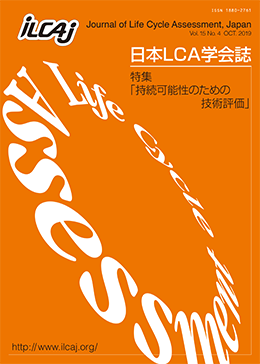Volume 15, Issue 4
Displaying 1-16 of 16 articles from this issue
- |<
- <
- 1
- >
- >|
Contents
-
2019Volume 15Issue 4 Pages Toc_1-Toc_4
Published: 2019
Released on J-STAGE: October 25, 2019
Download PDF (1358K)
Foreword
-
2019Volume 15Issue 4 Pages 315
Published: 2019
Released on J-STAGE: October 25, 2019
Download PDF (1406K)
Special Issue: Technology Assessment for Sustainability
Review Article
-
2019Volume 15Issue 4 Pages 316-324
Published: 2019
Released on J-STAGE: October 25, 2019
Download PDF (3510K)
Commentary and Discussion
-
2019Volume 15Issue 4 Pages 325-331
Published: 2019
Released on J-STAGE: October 25, 2019
Download PDF (5910K) -
2019Volume 15Issue 4 Pages 332-335
Published: 2019
Released on J-STAGE: October 25, 2019
Download PDF (1555K) -
2019Volume 15Issue 4 Pages 336-342
Published: 2019
Released on J-STAGE: October 25, 2019
Download PDF (1604K)
Research Article
-
2019Volume 15Issue 4 Pages 343-359
Published: 2019
Released on J-STAGE: October 25, 2019
Download PDF (12218K) -
2019Volume 15Issue 4 Pages 360-376
Published: 2019
Released on J-STAGE: October 25, 2019
Download PDF (2627K)
Erratum
-
2019Volume 15Issue 4 Pages 377
Published: 2019
Released on J-STAGE: October 25, 2019
Download PDF (1408K)
Report
-
2019Volume 15Issue 4 Pages 378-388
Published: 2019
Released on J-STAGE: October 25, 2019
Download PDF (5178K)
Column
-
2019Volume 15Issue 4 Pages 389-390
Published: 2019
Released on J-STAGE: October 25, 2019
Download PDF (1138K)
Introduction of Research Group
-
2019Volume 15Issue 4 Pages 391-392
Published: 2019
Released on J-STAGE: October 25, 2019
Download PDF (1648K)
Introduction of Supporting Corporate Members
-
2019Volume 15Issue 4 Pages 393-395
Published: 2019
Released on J-STAGE: October 25, 2019
Download PDF (112577K)
Supporting Members
-
2019Volume 15Issue 4 Pages 396
Published: 2019
Released on J-STAGE: October 25, 2019
Download PDF (1089K)
All about ILCAJ
-
2019Volume 15Issue 4 Pages 397-412
Published: 2019
Released on J-STAGE: October 25, 2019
Download PDF (1668K)
Announcement
-
2019Volume 15Issue 4 Pages i-vi
Published: 2019
Released on J-STAGE: October 25, 2019
Download PDF (1303K)
- |<
- <
- 1
- >
- >|
